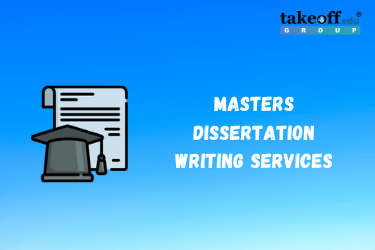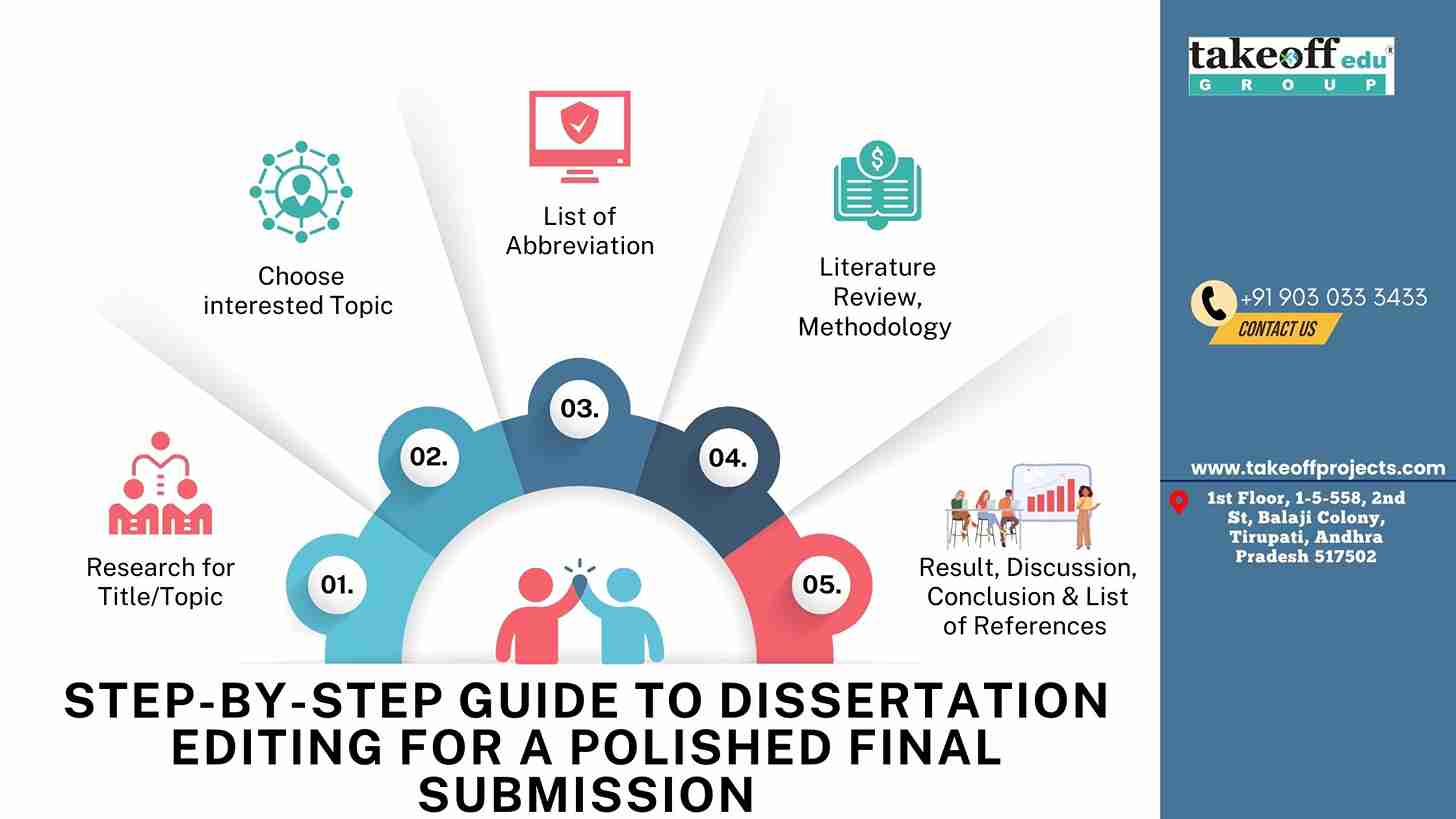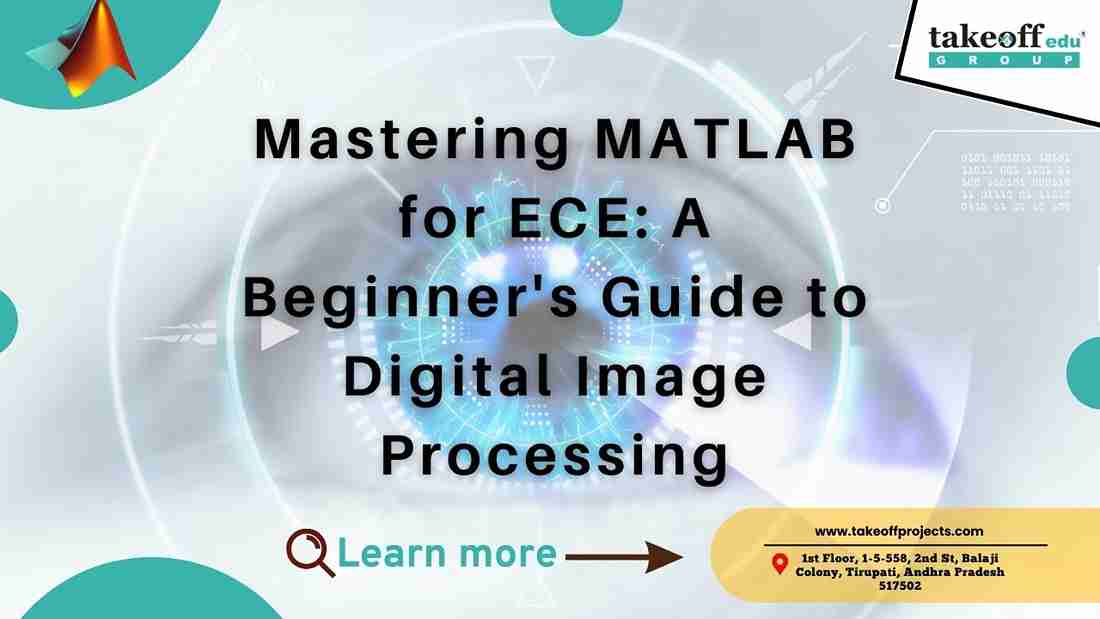When most of the PG students initially come across the phrase "Dissertation," they experience an unknown sense of dread! The dissertation, an integral part of the majority of postgraduate degree programmes, may make or break an academic career. However, if you know how to make a good dissertation, there's no need to waste time worrying and stressing out.
A master's programme is more than merely an extension of undergraduate study. It's an acculturation process since you'll become an expert in a certain topic of study. With an undergraduate degree, you may apply for a variety of professions, but a master's degree will place you on a certain career path. Therefore, it can undoubtedly improve your career possibilities in a specialised field. The dissertation or thesis component is crucial to the Master's programme. It is your final product after completing a master's degree programme, especially when you are lacking with professional experience. Tell the employer what you can provide through your thesis or project. And mostly during a job interview, you will almost certainly be asked to summarise your dissertation project.
This blog will give you some tips about how to start the Masters Dissertation Writing, why Masters Dissertation is so important, requirements or structure of the Masters Dissertation, important tips to choose a right topic for master’s dissertation. First let’s look at the basic information about Dissertation and Masters Dissertation.
What is a Dissertation?
A dissertation is a lengthy essay about a subject you have researched, typically for a university degree. A research project that is finished as a qualification for an undergraduate or postgraduate degree is called a dissertation. Generally, a dissertation offers the opportunity for students to discuss their research in answer to a thesis or issue of their own selection.
The project's objective is to test students' ability to do independent research, and the assessment will be utilised to decide their final grade. The dissertation project is mainly autonomous, but your instructors typically provide some help.
The majority of students will finish this task at university, which will be the most time-consuming, challenging, and crucial one yet (the library might become a second home). But it may also be highly rewarding, especially if you're enthusiastic about the subject you've chosen. Thus, it is unquestionably a good decision to select a topic that captivates your curiosity or interest.
Types of Dissertations
Your course of study will determine the kind of dissertation you write. However, the dissertation may often be separated into two categories, such as:
Empirical Dissertations
Non-Empirical Dissertations
Empirical Dissertations
Empirical dissertations, such as those written for psychology degrees, require gathering data. This can entail following moral and professional standards when gathering information from the general population. Natural and biological science empirical dissertations may include laboratory work or be totally focused on it.
Non-Empirical Dissertations
Non-Empirical Dissertations rely on facts and justifications found in the writings of others. This probably entails spending a lot of time sucked up in a book! In this kind of dissertation, you must be careful to not only summarise what others have said but also to analyse the work critically and consider how it may be used in real-world situations.
Meaning of Masters Dissertation
A lengthy essay on a subject of the student's choosing constitutes a master's dissertation. It entails extensive amounts of research and writing and is carried out under the supervision of a faculty supervisor. Dissertations are often lengthier in theoretical subjects and shorter in practical fields, depending on your topic of study.
Why to do Masters Dissertation?
The best way to guarantee the masters dissertation writing process to be relatively easy and achieve good result is to approach it with good knowledge. Therefore, keeping the primary aim of dissertation in mind might be beneficial. In general, a master's thesis gives you the chance to gain a better grasp of a particular field of study and to demonstrate that mastery. You're gaining a greater understanding of the subject matter while simultaneously putting your writing and research talents on display.
The master dissertation is generally often completed at or close to the end of a period of study, giving you the opportunity to continue working on a particular area of your education. The master's thesis is often seen as an example of autonomous work and frequently—but not always—serves as a stage in preparation for doctoral work.
Also read : Journal Publication Assistance
How to Start Writing a Masters Dissertation?
Writing down their thoughts and discoveries is one of the biggest difficulties students have. Even while writing is a talent in and of itself, with the appropriate guidance it will be much simpler for you to get into the flow and complete your master's thesis or dissertation.
In order to help you write a master's thesis or dissertation, we've put up a step-by-step guide that includes important advice.
Recognize the subject of your thesis or dissertation.
Organize your thesis or dissertation. A chapter-organized master's dissertation or thesis normally includes many components such a title page, abstract, table of contents, collection of chapters (according to the demands of the topic), bibliography, and appendices.
Put your literature evaluation in writing.
Summarize your research.
Discuss and assess.
Write your introductory paragraph.
Keep a record of your reading list.
Prevent unintentional plagiarism.
Keep in mind about the format of the institution or university.
Remember the deadline for submitting your thesis.
Structure of the Masters Dissertation
The following dissertation format will commonly be included in a master's dissertation, however the length and specifics will vary depending on the area of study:
Abstract – A short description that places your study in perspective, describes your methods, and highlights your results.
Literature Review – The most significant theories and philosophies that are related to your research are summarised in the chapter.
Methodology – A dissertation chapter or statement that describes the research methodologies you utilised and explains why you used them.
Analytical Chapters – These chapters, which make up the bulk of the dissertation, offer a critical evaluation of the source material or topic you've selected.
Conclusion – This chapter summarises your study and offers further research avenues.
Bibliography – A full bibliography that adheres to the style requirements for your discipline is requested.
How to Choose the Right Topic for Masters Dissertation?
The most stressful part of writing a thesis, after actually finishing it, might be choosing a topic. You wish for it to be something intriguing that is neither too wide or so limited that you can't write about it.
Guides can also have a big impact in this area, for good or bad, but you should at least have a rough notion, which was probably inspired by something you learned in class. However, if you are completely stumped, we advise compiling a dozen or more current scholarly publications in your field of interest. They should be as recent as feasible because this shows what is being discussed right now. After completing them, maybe something will stick out that you can discuss with an adviser.
It's not simple to choose a thesis topic. Within our respective disciplines, we are expected to discover something intriguing, creative, and pertinent. As the deadline for submitting a thesis idea and potential supervisor draws near, the anxiousness grows every day. This is perhaps more difficult than actually writing the thesis. Here are some suggestions to help you locate something intriguing, doable, and maybe innovative.
Choose a new topic for your class assignment.
Don't be too specific, and conduct extensive study on your interested topic.
Identify something you are passionate about or interested in.
Enhance your interests by utilising your class assignments.
Discuss it with others.
And most importantly, discuss with the professors about the topic you are interested in.
Conclusion
This blog article gives you some important tips about the basic concepts of computer science engineering. First this blog gives basic information regarding the what is dissertation, meaning of master’s dissertation. Then the reason behind their significance is also stressed in “Why to do Masters Dissertation”. Then the students are given with basic idea about how to start writing the masters dissertation. Further topics like structure of master’s dissertation, tips to choose the right topic for master’s dissertation were also stressed upon in this article.
Why Takeoff Projects? How can it help with the Dissertation Writing?
Takeoff Projects has an exclusive department of professionals and trainers who are experts in Masters Dissertation Writing Services. Moreover, Takeoff Projects have provided dissertation help to numerous students from various domains and departments. We are capable of successfully completing your dissertation writing from the initial state to final state within the stipulated time. You can also offer guidance to your dissertation through our online dissertation writing service. Please visit our website for availing the online services. You can either get ideas about dissertation writing either referring to our list of PG projects done by us across various domains or can choose your own thoughts.

 PhD in Electrical Engineering: Research & Writing Support
PhD in Electrical Engineering: Research & Writing Support  Which are the Best PhD Assistance and Dissertation Writing Services in India?
Which are the Best PhD Assistance and Dissertation Writing Services in India?  How to Choose a PhD Research Domain: EEE, ECE, or CSE?
How to Choose a PhD Research Domain: EEE, ECE, or CSE?  The Ultimate PhD Toolkit for EEE, ECE and CSE Students
The Ultimate PhD Toolkit for EEE, ECE and CSE Students  Publication Success in EEE, ECE, and CSE: Expert Tips for Engineering Scholars
Publication Success in EEE, ECE, and CSE: Expert Tips for Engineering Scholars  Your PhD Guide to Multi-Disciplinary Research in Engineering and Technology
Your PhD Guide to Multi-Disciplinary Research in Engineering and Technology  Top PhD Topics across EEE, ECE, and CSE: Bridging Innovation and Impact
Top PhD Topics across EEE, ECE, and CSE: Bridging Innovation and Impact  Top Embedded Systems Projects for Engineering Students
Top Embedded Systems Projects for Engineering Students  Crafting the Future of Tech: PhD Research Trends in Software Engineering
Crafting the Future of Tech: PhD Research Trends in Software Engineering  From Algorithms to Applications: Comprehensive PhD Support for CSE Students
From Algorithms to Applications: Comprehensive PhD Support for CSE Students  Cybersecurity and Blockchain: Pioneering Research Areas for PhD Scholars
Cybersecurity and Blockchain: Pioneering Research Areas for PhD Scholars  The Art of Writing High-Impact Research Papers in CSE Domains
The Art of Writing High-Impact Research Papers in CSE Domains  AI, ML, and Big Data: Emerging PhD Topics in CSE to Watch
AI, ML, and Big Data: Emerging PhD Topics in CSE to Watch  Top Research Trends in Electrical Drives for Aspiring PhD Scholars
Top Research Trends in Electrical Drives for Aspiring PhD Scholars  Transforming Ideas into Impact: Dissertation Help for EEE Scholars
Transforming Ideas into Impact: Dissertation Help for EEE Scholars  Navigate Your PhD with Confidence: Comprehensive Assistance Every Step of the Way
Navigate Your PhD with Confidence: Comprehensive Assistance Every Step of the Way  ECE Dissertation Success: Expert Tips for Writing and Publishing your Academic Success
ECE Dissertation Success: Expert Tips for Writing and Publishing your Academic Success  Breaking Barriers in Signal Processing: PhD Research Simplified
Breaking Barriers in Signal Processing: PhD Research Simplified  Building the Next-Gen Tech: A Guide to ECE Research and Publication
Building the Next-Gen Tech: A Guide to ECE Research and Publication  From Circuits to Control Systems: Navigating EEE Research with Expert Guidance
From Circuits to Control Systems: Navigating EEE Research with Expert Guidance  From Data to Discovery: Quantitative Analysis That Drives Results
From Data to Discovery: Quantitative Analysis That Drives Results  Future of IoT and Wireless Communication: Top PhD Opportunities in ECE
Future of IoT and Wireless Communication: Top PhD Opportunities in ECE  Top PhD Topics Energy Management in Power Electronics
Top PhD Topics Energy Management in Power Electronics  Exploring VLSI Design and Embedded Systems: Winning Research Topics for ECE Scholars
Exploring VLSI Design and Embedded Systems: Winning Research Topics for ECE Scholars  Expert-Approved Techniques for Crafting a Winning PhD Synopsis
Expert-Approved Techniques for Crafting a Winning PhD Synopsis  Writing with Purpose: How to Create Engaging Seminar Papers That Stand Out
Writing with Purpose: How to Create Engaging Seminar Papers That Stand Out  Unlocking Publication Success: Your Guide to High-Impact Journal Articles
Unlocking Publication Success: Your Guide to High-Impact Journal Articles  Mastering Energy Management: Top PhD Topics in Power Electronics
Mastering Energy Management: Top PhD Topics in Power Electronics  PhD Topic Selection Simplified: Choosing What Matters Most to You
PhD Topic Selection Simplified: Choosing What Matters Most to You  Plagiarism No More: Essential Tools and Techniques for PhD Scholars
Plagiarism No More: Essential Tools and Techniques for PhD Scholars  Step-by-Step Guide to Dissertation Editing for a Polished Final Submission
Step-by-Step Guide to Dissertation Editing for a Polished Final Submission  Why Literature Review Is the Backbone of Your PhD Research?
Why Literature Review Is the Backbone of Your PhD Research?  Accelerate Your Research: Software Implementation Made Easy for PhD Students
Accelerate Your Research: Software Implementation Made Easy for PhD Students  Stress-Free PhD Viva Voce Preparation: Expert Tips to Impress Examiners
Stress-Free PhD Viva Voce Preparation: Expert Tips to Impress Examiners  Transforming Data into Insights: Qualitative and Quantitative Analysis Explained
Transforming Data into Insights: Qualitative and Quantitative Analysis Explained  The Art of Problem Identification: Laying the Foundation for PhD Success
The Art of Problem Identification: Laying the Foundation for PhD Success  Say Goodbye to Plagiarism Worries: A Guide to Flawless Dissertation Writing
Say Goodbye to Plagiarism Worries: A Guide to Flawless Dissertation Writing  From Idea to Impact: Crafting High-Quality Conference and Seminar Papers
From Idea to Impact: Crafting High-Quality Conference and Seminar Papers  Crack the Code of Successful Publications: Comprehensive PhD Support
Crack the Code of Successful Publications: Comprehensive PhD Support  Top Strategies for Writing a Journal Ready Manuscript with Zero Plagiarism
Top Strategies for Writing a Journal Ready Manuscript with Zero Plagiarism  How to Nail Your PhD Research Proposal: Tips from the Pros
How to Nail Your PhD Research Proposal: Tips from the Pros  Understanding the Basics of Power Systems: A Comprehensive Guide
Understanding the Basics of Power Systems: A Comprehensive Guide  Turn Research Challenges into Opportunities: Expert PhD Consultation Services
Turn Research Challenges into Opportunities: Expert PhD Consultation Services  Mastering MATLAB for ECE: A Beginner's Guide to Digital Image Processing
Mastering MATLAB for ECE: A Beginner's Guide to Digital Image Processing  Mastering Your PhD Journey: From Topic Selection to Dissertation Success
Mastering Your PhD Journey: From Topic Selection to Dissertation Success  Assignment Writing Service
Assignment Writing Service  PhD Research Assistance
PhD Research Assistance  PhD Thesis Writing Services
PhD Thesis Writing Services  Journal Paper Writing
Journal Paper Writing  Research Paper Writing Services
Research Paper Writing Services 
 Paper Publishing
Paper Publishing


